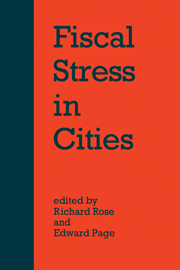Book contents
- Frontmatter
- Contents
- Acknowledgments
- 1 Can Government Control Itself?
- 2 Pressures in Whitehall
- 3 Pressures from Whitehall
- 4 The Decline of Urban Economies
- 5 Local Government as an Employer
- 6 Do Fewer Pupils Mean Falling Expenditure?
- 7 Local Autonomy and Intergovernmental Finance in Britain and the United States
- 8 Chronic Instability in Fiscal Systems
4 - The Decline of Urban Economies
Published online by Cambridge University Press: 07 October 2011
- Frontmatter
- Contents
- Acknowledgments
- 1 Can Government Control Itself?
- 2 Pressures in Whitehall
- 3 Pressures from Whitehall
- 4 The Decline of Urban Economies
- 5 Local Government as an Employer
- 6 Do Fewer Pupils Mean Falling Expenditure?
- 7 Local Autonomy and Intergovernmental Finance in Britain and the United States
- 8 Chronic Instability in Fiscal Systems
Summary
Urban change and its costs are no novelty; it is almost exactly a century since Mearns (1883) published The Bitter Cry of Outcast London. Nor is the concern of governments with the costs of urban change new. Indeed, whenever governments have attempted to leave the cities to their own fates, as in the periods 1854–70 or 1921–9, the sheer pressure of events has eventually forced a renewal of intervention. It is already evident that the street disturbances of 1981 constitute a major challenge to present urban policy and it would be surprising if these disturbances did not produce some change of direction by central and local government.
Historically, questions of urban change have tended to dominate the agenda of central-local relations in Britain. But the urban problems of the 1980s are quite unlike those of the 1880s. Victorian urban problems arose from industrialisation and urban growth, from a mismatch between population growth and the development of urban infrastructure, from shifts in the arrangement of the space economy, in particular labour and capital, in favour of cities. The problems of social and fiscal stress in the 1980s arise from the obverse of these developments: urban disinvestment and decline. There is something new about recent urban change, something that is caught by the terms counterurbanisation or the post–City age. There is something new in national policy too, an arguably misplaced concern with economic regeneration to the virtual exclusion of ameliorative social measures.
- Type
- Chapter
- Information
- Fiscal Stress in Cities , pp. 77 - 106Publisher: Cambridge University PressPrint publication year: 1983



